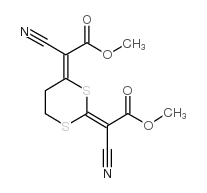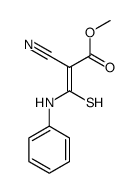52046-75-0
| Name | methyl 2-cyano-2-[4-(1-cyano-2-methoxy-2-oxoethylidene)-1,3-dithietan-2-ylidene]acetate |
|---|---|
| Synonyms | MFCD00144133 |
| Density | 1.564g/cm3 |
|---|---|
| Boiling Point | 380.2ºC at 760mmHg |
| Melting Point | 229-235ºC |
| Molecular Formula | C12H10N2O4S2 |
| Molecular Weight | 310.34900 |
| Flash Point | 183.8ºC |
| Exact Mass | 310.00800 |
| PSA | 150.78000 |
| LogP | 1.71536 |
| Index of Refraction | 1.641 |
Synonym:None known Section 2 - COMPOSITION, INFORMATION ON INGREDIENTS
Risk Phrases: None Listed. Section 3 - HAZARDS IDENTIFICATION EMERGENCY OVERVIEW
Not available. Potential Health Effects Eye: Non-irritating to the eyes. Skin: Non-irritating to the skin. Ingestion: Low hazard for usual industrial handling. Inhalation: Low hazard for usual industrial handling. Chronic: None Section 4 - FIRST AID MEASURES Eyes: Flush eyes with plenty of water for at least 15 minutes, occasionally lifting the upper and lower eyelids. If irritation develops, get medical aid. Skin: Flush skin with plenty of water for at least 15 minutes while removing contaminated clothing and shoes. Get medical aid if irritation develops or persists. Ingestion: Wash mouth out with water. Get medical aid if irritation or symptoms occur. Inhalation: Remove from exposure and move to fresh air immediately. Get medical aid if cough or other symptoms appear. Notes to Physician: Section 5 - FIRE FIGHTING MEASURES General Information: As in any fire, wear a self-contained breathing apparatus in pressure-demand, MSHA/NIOSH (approved or equivalent), and full protective gear. During a fire, irritating and highly toxic gases may be generated by thermal decomposition or combustion. Extinguishing Media: Use foam, dry chemical, or carbon dioxide. Section 6 - ACCIDENTAL RELEASE MEASURES General Information: Use proper personal protective equipment as indicated in Section 8. Spills/Leaks: Vacuum or sweep up material and place into a suitable disposal container. Avoid generating dusty conditions. Provide ventilation. Section 7 - HANDLING and STORAGE Handling: Wash hands before eating. Minimize dust generation and accumulation. Avoid breathing dust, vapor, mist, or gas. Avoid contact with skin and eyes. Use with adequate ventilation. Storage: Store in a cool, dry place. Store in a tightly closed container. No special precautions indicated. Section 8 - EXPOSURE CONTROLS, PERSONAL PROTECTION Engineering Controls: Facilities storing or utilizing this material should be equipped with an eyewash facility and a safety shower. Use adequate ventilation to keep airborne concentrations low. Exposure Limits CAS# 52046-75-0: Personal Protective Equipment Eyes: Wear appropriate protective eyeglasses or chemical safety goggles as described by OSHA's eye and face protection regulations in 29 CFR 1910.133 or European Standard EN166. Skin: Wear appropriate protective gloves to prevent skin exposure. Clothing: Wear appropriate protective clothing to minimize contact with skin. Respirators: A NIOSH/MSHA approved air purifying dust or mist respirator or European Standard EN 149. Section 9 - PHYSICAL AND CHEMICAL PROPERTIES Physical State: Crystalline powder Color: white to light yellow Odor: none reported pH: Not available. Vapor Pressure: Not available. Viscosity: Not available. Boiling Point: Not available. Freezing/Melting Point: 229 - 235 deg C Autoignition Temperature: Not applicable. Flash Point: Not applicable. Explosion Limits, lower: Not available. Explosion Limits, upper: Not available. Decomposition Temperature: Solubility in water: Specific Gravity/Density: Molecular Formula: C10H6N2O4S2 Molecular Weight: 282.27 Section 10 - STABILITY AND REACTIVITY Chemical Stability: Stable under normal temperatures and pressures. Conditions to Avoid: Incompatible materials, dust generation. Incompatibilities with Other Materials: None reported. Hazardous Decomposition Products: Carbon monoxide, oxides of nitrogen, oxides of sulfur, carbon dioxide. Hazardous Polymerization: Has not been reported Section 11 - TOXICOLOGICAL INFORMATION RTECS#: CAS# 52046-75-0 unlisted. LD50/LC50: Not available. Carcinogenicity: Dimethyl-2,2-(1,3-Dithietan-2,4-Diyliden)-Bis-(2-Cyanoacetate) - Not listed by ACGIH, IARC, or NTP. Section 12 - ECOLOGICAL INFORMATION Section 13 - DISPOSAL CONSIDERATIONS Dispose of in a manner consistent with federal, state, and local regulations. Section 14 - TRANSPORT INFORMATION IATA Not regulated as a hazardous material. IMO Not regulated as a hazardous material. RID/ADR Not regulated as a hazardous material. Section 15 - REGULATORY INFORMATION European/International Regulations European Labeling in Accordance with EC Directives Hazard Symbols: Not available. Risk Phrases: Safety Phrases: S 24/25 Avoid contact with skin and eyes. WGK (Water Danger/Protection) CAS# 52046-75-0: No information available. Canada None of the chemicals in this product are listed on the DSL/NDSL list. CAS# 52046-75-0 is not listed on Canada's Ingredient Disclosure List. US FEDERAL TSCA CAS# 52046-75-0 is not listed on the TSCA inventory. It is for research and development use only. SECTION 16 - ADDITIONAL INFORMATION N/A |
| Safety Phrases | S24/25 |
|---|
| Precursor 0 | |
|---|---|
| DownStream 1 | |

